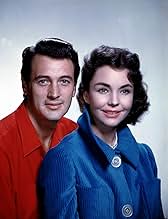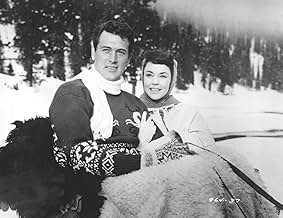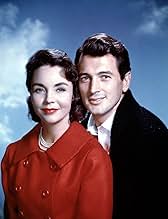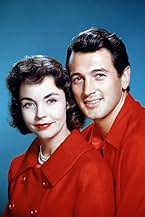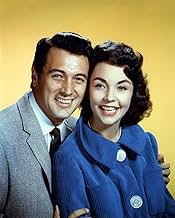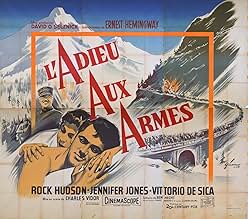NOTE IMDb
5,8/10
3,1 k
MA NOTE
Une infirmière anglaise et un soldat américain sur le front italien pendant la Première Guerre mondiale tombent amoureux, mais les horreurs qui les entourent mettent leur romance à rude épre... Tout lireUne infirmière anglaise et un soldat américain sur le front italien pendant la Première Guerre mondiale tombent amoureux, mais les horreurs qui les entourent mettent leur romance à rude épreuve.Une infirmière anglaise et un soldat américain sur le front italien pendant la Première Guerre mondiale tombent amoureux, mais les horreurs qui les entourent mettent leur romance à rude épreuve.
- Réalisation
- Scénario
- Casting principal
- Nommé pour 1 Oscar
- 1 victoire et 2 nominations au total
José Nieto
- Major Stampi
- (as Jose Nieto)
Georges Bréhat
- Captain Bassi
- (as Georges Brehat)
Luigi Barzini
- Court Martial Colonel
- (non crédité)
Memmo Carotenuto
- Nino the Doorkeeper
- (non crédité)
Avis à la une
Obviously, a great deal of time and money was lavished on this project. Producer Selznick intended it to be a vindication of a career that peaked with "Gone With The Wind" in 1939, and then began a long, slow, almost painful decline. By the mid fifties he had become something of a "has-been" in Hollywood. The result? Pretty much a miss. The book is probably unfilmable, of course, but the screenplay still leaves much to be desired. Rock Hudson is far too shallow to make a go at the over-the-top emotionalism this story needs. The usually wonderful Jennifer Jones, for whom this project was conceived, somehow doesn't seem to exhibit the idealism and resolve the part needs, and that she demonstrated with such seemingly effortlessness in many other films. The direction is stilted and sometimes downright awkward, more the fault of producer Selznick, I would bet, who had a reputation for micro-managing his films, than famed director Charles Vidor.
Simply put, I'm never convinced, not even for a moment, that what is happening is real and not just another movie. Too bad.
Simply put, I'm never convinced, not even for a moment, that what is happening is real and not just another movie. Too bad.
Rock Hudson wasn't bad but it was painfully obvious that Jennifer Jones was a lot older than him. It was absurd she was supposed to be English when she sounded just as American as Hudson and Elaine Stritch. The film is spectacular but too overblown for a trifling romantic story.
There are so many things that are wrong here - not just the fact that Jennifer Jones was too old to play this part in husband Selznick's movie. First, the script. At times, it is very good, while at others it is amateurish and downright silly. You cringe as the actors say some of their embarrassing bad dialogue. Second, the production values are just as inconsistent. Sometimes, the film looks cheap and like it was made on a dime (for example, it's got some of the worst painted backdrops ever filmed - so obviously fake). But, when it is filmed in actual Italian locales, it looks terrific. Third, the acting by the Jones and Hudson is irritating. They really ham it up so much that it must be seen to be believed. In the more lighthearted segments they are sickeningly sweet and sentimental, while in the dramatic parts, they are so overwrought or serious that you just want to slap them into sensibility. The supporting cast is excellent : Vittorio DeSica (who even managed to get nominated for an Oscar for his performance here), the always interesting Mercedes McCambridge, Oskar Homolka, Kurt Kaszner, and the wonderful Elaine Stritch, who someone had the great sense to cast in her role as a sympathetic nurse. The problem is, the two big hams (Jones and Hudson) keep getting in their way, distracting from their fine performances. Maybe that's why DeSica got his nomination - the Academy felt sorry for him. I've read that the filming of this was beset by many problems caused by producer Selznick, who kept firing staff and replacing them. To many cooks spoil the soup - and that old adage is proven here. The result : an embarrassing critical and box office failure.
Selznick never made another movie.
Jones wouldn't make another movie for 5 years.
And Hudson's career was in the dumper until he made a big comeback in those Doris Day movies.
All in all, watch this if you want to be entertained by some jaw-dropping ineptitude. It's kind of amazing.
Selznick never made another movie.
Jones wouldn't make another movie for 5 years.
And Hudson's career was in the dumper until he made a big comeback in those Doris Day movies.
All in all, watch this if you want to be entertained by some jaw-dropping ineptitude. It's kind of amazing.
Of the top 6 reviews I currently see here, 3 are slamming Jennifer Jones for being too old, 1 is slamming producer David Selznick for being in the decline of his career, 1 is whining that it's not like the book, and 1 is slamming writer Hemingway for not doing any fighting in the war (Um... he was an ambulance driver).
While this film may not deserve an Academy award for best picture, it certainly deserves a decent review on IMDb dedicated to the film itself. So here goes my attempt.
"A Farewell to Arms" is a lavish production of a love story set against the backdrop of World War I. In that respect it's in the same genre as other classic war romances "Gone with the Wind", "Casablanca" and "Platoon ". Haha just checking to see if you're paying attention. Everyone knows "Casablanca" was not set in a war but an occupation.
Where "Farewell" differs from these other classics is in the distribution of war & romance. "Farewell" features far more battle scenes (4) compared to "Gone with the Wind" (zero) and "Casablanca" (zero). The result may be a bit disappointing in the romance department, and several reviewers (as well as the New York Times review on the film's release) have complained about the "lack of chemistry" between the two leads. I think this perception is simply due to the fact that less time is spent setting up the romance, putting more of a burden on the viewer to accept a relationship that simply happens. Viewers may also feel romantically cheated because this is not a traditional romance between two traditional individuals who dream of immediately getting married and having kids and a dog. But in fact this purposely informal, slightly dysfunctional romance is what ultimately made it interesting to me because it marked a change of formula in the age-old Hollywood romance.
If you see this movie, pay close attention to Jennifer Jones' excellent portrayal of a reluctant lover who is perhaps suffering from too many demons to actually fall in love completely, the way she wants to. She is riddled with insecurities, conflicts and possibly guilt, making her like the the stereotypical guy who can't commit. Meanwhile Rock Hudson plays a character more like the stereotypical lovesick schoolgirl. If you enjoy stereotype reversals like this, you'll definitely find yourself interested in their "lack of chemistry".
Was Jennifer Jones too old (late 30s) to play the role of Katherine as Hemingway had intended her (early 20s)? Probably. Did Jennifer get the part because she was married to producer Selznick? Absolutely. Does any of this make her a bad actress? No way. Short of Vivien Leigh, I think she was the best person to play the role as she did: the troubled lover whose cynical, morbid thoughts were always brewing not far away, despite her outwardly cheerful appearance. Actually I take back the thing about Vivien Leigh being better; the more I think about it, Jennifer was ideal for this sort of character.
A subplot involving Vittorio de Sica's war-weary character descending into madness is sure to catch your attention. It was actually my favorite part of the movie, and I wish they had spent more time on this complex character shift as well as his interesting polite antagonism of the church (with a spectacular short speech he says to the priest near the end). But alas, with the romance and the battle scenes already vying for screen time, Vittorio's story only got 2 or 3 dedicated scenes. They were powerful nonetheless.
Yes, as others mentioned, the ending seemed abrupt. But after thinking about it, I think it was perfectly in line with some of the interesting & unusual themes that the story set up. In short, this is not a straightforward soldier-meets-girl love story. The conflicts that are presented (particularly in Jennifer Jones' mysteriously troubled psyche) make this romance much more than meets the eye. If you enjoy wartime romances that are not always formulaic love stories (i.e. they may contain hidden dysfunctional surprises), check this one out.
While this film may not deserve an Academy award for best picture, it certainly deserves a decent review on IMDb dedicated to the film itself. So here goes my attempt.
"A Farewell to Arms" is a lavish production of a love story set against the backdrop of World War I. In that respect it's in the same genre as other classic war romances "Gone with the Wind", "Casablanca" and "Platoon ". Haha just checking to see if you're paying attention. Everyone knows "Casablanca" was not set in a war but an occupation.
Where "Farewell" differs from these other classics is in the distribution of war & romance. "Farewell" features far more battle scenes (4) compared to "Gone with the Wind" (zero) and "Casablanca" (zero). The result may be a bit disappointing in the romance department, and several reviewers (as well as the New York Times review on the film's release) have complained about the "lack of chemistry" between the two leads. I think this perception is simply due to the fact that less time is spent setting up the romance, putting more of a burden on the viewer to accept a relationship that simply happens. Viewers may also feel romantically cheated because this is not a traditional romance between two traditional individuals who dream of immediately getting married and having kids and a dog. But in fact this purposely informal, slightly dysfunctional romance is what ultimately made it interesting to me because it marked a change of formula in the age-old Hollywood romance.
If you see this movie, pay close attention to Jennifer Jones' excellent portrayal of a reluctant lover who is perhaps suffering from too many demons to actually fall in love completely, the way she wants to. She is riddled with insecurities, conflicts and possibly guilt, making her like the the stereotypical guy who can't commit. Meanwhile Rock Hudson plays a character more like the stereotypical lovesick schoolgirl. If you enjoy stereotype reversals like this, you'll definitely find yourself interested in their "lack of chemistry".
Was Jennifer Jones too old (late 30s) to play the role of Katherine as Hemingway had intended her (early 20s)? Probably. Did Jennifer get the part because she was married to producer Selznick? Absolutely. Does any of this make her a bad actress? No way. Short of Vivien Leigh, I think she was the best person to play the role as she did: the troubled lover whose cynical, morbid thoughts were always brewing not far away, despite her outwardly cheerful appearance. Actually I take back the thing about Vivien Leigh being better; the more I think about it, Jennifer was ideal for this sort of character.
A subplot involving Vittorio de Sica's war-weary character descending into madness is sure to catch your attention. It was actually my favorite part of the movie, and I wish they had spent more time on this complex character shift as well as his interesting polite antagonism of the church (with a spectacular short speech he says to the priest near the end). But alas, with the romance and the battle scenes already vying for screen time, Vittorio's story only got 2 or 3 dedicated scenes. They were powerful nonetheless.
Yes, as others mentioned, the ending seemed abrupt. But after thinking about it, I think it was perfectly in line with some of the interesting & unusual themes that the story set up. In short, this is not a straightforward soldier-meets-girl love story. The conflicts that are presented (particularly in Jennifer Jones' mysteriously troubled psyche) make this romance much more than meets the eye. If you enjoy wartime romances that are not always formulaic love stories (i.e. they may contain hidden dysfunctional surprises), check this one out.
The Gary Cooper/Helen Hayes version of A Farewell To Arms, well acted for the time it was made, seems dated now. The 1957 version of Hemingway's great romantic novel is, like The Sun Also Rises, another adaptation of one of Papa's masterpieces, pretty to look at, expensively made, and wooden in all other respects.
In this version Hudson is earnest but bland, Jones too old, De Sica in the wrong movie and Stritch, well, her acid nurse is one of the film's only bright spots.
But the real reason to see the film is the ravishing musical score by Mario Nasciembe. Talk about romantic! Talk about lush! Talk about unforgettable! Had the film been as good as it's musical score it would have been a classic; what A Farewell To Arms ultimately is though, is an overstuffed period piece and a tepid finale to the great David Selznick's career. (By the way should you want to skip the film, the soundtrack is currently available on CD.)
In this version Hudson is earnest but bland, Jones too old, De Sica in the wrong movie and Stritch, well, her acid nurse is one of the film's only bright spots.
But the real reason to see the film is the ravishing musical score by Mario Nasciembe. Talk about romantic! Talk about lush! Talk about unforgettable! Had the film been as good as it's musical score it would have been a classic; what A Farewell To Arms ultimately is though, is an overstuffed period piece and a tepid finale to the great David Selznick's career. (By the way should you want to skip the film, the soundtrack is currently available on CD.)
Le saviez-vous
- AnecdotesRock Hudson turned down The Bridge on the River Kwai (1957), Sayonara (1957) and Ben-Hur (1959) in order to make this film. He later said this was the biggest mistake of his career.
- GaffesThe British nurses at the hospital all have American accents.
- Citations
Major Alessandro Rinaldi: She's very strange, very moody, who knows she might even prefer you to me.
- Crédits fousProducer David O. Selznick tries to imitate the opening credits of his classic film, "Gone With The Wind", by having the letters of the title "A Farewell to Arms" sweep slowly across the screen from right to left.
- ConnexionsFeatured in Au coeur du temps: The Ghost of Nero (1967)
Meilleurs choix
Connectez-vous pour évaluer et suivre la liste de favoris afin de recevoir des recommandations personnalisées
- How long is A Farewell to Arms?Alimenté par Alexa
Détails
Box-office
- Budget
- 4 353 000 $US (estimé)
- Montant brut mondial
- 18 989 $US
- Durée2 heures 32 minutes
- Couleur
- Rapport de forme
- 2.35 : 1
Contribuer à cette page
Suggérer une modification ou ajouter du contenu manquant

Lacune principale
By what name was L'adieu aux armes (1957) officially released in India in English?
Répondre

